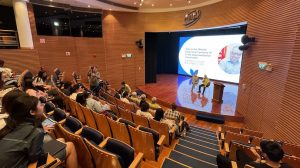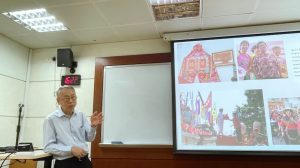Ms. Deland Leong Wai Man, Head of the Department of Cultural Heritage at the Macao Cultural Affairs Bureau, says urban development and heritage protection are not conflicting forces. Tourism can also lend a helping hand to promote heritage, she adds
– The Cultural Affairs Bureau has invested a lot of resources in heritage protection and promotion in Macao. Why is this investment important for the city?
Through heritage – no matter whether it is tangible or intangible heritage – we can better understand our culture. We can see where we came from, and that helps to define our unique identity. Through our heritage, we can better understand what makes us different from other places: this is very important for the citizens of Macao.
– In Macao, heritage also plays an important role in tourism development.
Cities around the world increasingly understand that heritage assets can be very important resources for tourism development. Generally speaking, tourists like to see the local culture of the cities they visit. In that regard, heritage is a very important element. Heritage management and tourism can work hand-in-hand to show our culture not only to tourists but also to our own citizens.
– Macao’s heritage is unique, as it mixes Eastern and Western influences. What problems does this pose to Macao regarding heritage management?
This is not a problem but it is a challenge. Because the city’s heritage is a mix of Eastern and Western cultures, we cannot directly borrow the conservation techniques from China or from Portugal. Because of the unique cultural heritage of Macao, we have our very own, specific way to approach conservation, no matter whether it is regarding the techniques and materials used, the management or the promotion.
“Heritage management and tourism can work hand-in-hand to show our culture not only to tourists but also to our own citizens”
– How important is education for heritage protection in Macao?
It is very important. Talking about the Bachelor Degree Programme in Heritage Management at IFT, it is not specific to conservation or architectural engineering; it is about heritage in terms of logistics and management. For instance, at the Cultural Affairs Bureau, our job goes well beyond just implementing the “Cultural Heritage Protection Law”: we need to manage cultural heritage assets, as there are some heritage facilities opened to the public managed directly by us, such as the Mandarin’s House, the Lou Kau Mansion and some other sites. Knowing how to preserve or renovate those buildings is not enough: knowing how to manage them, understanding visitors’ needs, successfully organising events there, and promoting heritage itself are very important tasks as well. Having education programmes in these fields – namely at a degree level – is a big help to our work.
Heritage professionals in high demand
– As the importance of heritage grows in Macao and internationally, do you foresee an increase in demand for this type of professional?
I definitely do. When we look back at the effort the Government has put into cultural heritage protection – both for tangible and intangible assets – there has been quite a lot of progress. I think the community will continue increasing its efforts in this field. So we will need more and more people with this type of background to be involved in the sector.
– That also relates to a growing international trend to promote sustainable management of heritage. How does this trend translate in Macao?
Heritage management in Macao previously was focused on building conservation; now we are seeing a growing focus on the protection of intangible heritage, and archaeological and movable heritage assets as well. The scope of heritage management is much wider than previously. In addition, we before mostly focused on preserving churches, temples and public buildings; now, we are trying to preserve other types of buildings too. These are ways to extend the scope of heritage protection to other types of cultural assets. All this is part of an effort to promote a sustainable management of heritage: if we were only to focus on historic, grand buildings, most of the smaller buildings and intangible assets would simply disappear.
“When we look back at the effort the Government has put into cultural heritage protection – both for tangible and intangible assets – there has been quite a lot of progress. I think the community will continue increasing its efforts in this field”
We are working now on the “Historic Centre of Macao Protection and Management Plan”. This tool will also help promote a sustainable management of heritage in Macao. We will have a wider, higher-level vision on how to protect cultural heritage: it will not focus solely on how to preserve and renovate individual heritage buildings; it will also offer a clearer perception on how we can manage these resources better, in an integrated way.
– In Macao, often there is a debate on whether it is possible to balance urban development and heritage protection. Are these conflicting interests?
I think there is no conflict between the two concepts. If a city develops too fast and without concern for its cultural heritage, it is not a healthy development. Cultural heritage should play a role as a very important element on urban development. Cities can use cultural heritage as a tool to promote sustainable urban development.
– What are your expectations for the future of Macao’s heritage?
We are witnessing a positive turning point. The “Cultural Heritage Protection Law” came into effect on 1 March 2014 and that was the beginning of a new chapter on heritage-related matters. In the future, it is likely that more and more buildings will become officially classified as “heritage buildings”; also more and more intangible cultural items will be included in Macao’s list of intangible cultural heritage. Overall, I foresee that the number of classified assets will increase significantly. In tandem, we also have been doing a lot of heritage-related promotion work, particularly among locals: our aim is to enable more people to become aware of, and better to appreciate, their own culture.









